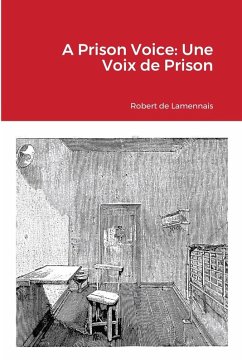Hugues-Félicité Robert de Lamennais (or De La Mennais) (19 June 1782 - 27 February 1854) was a French Catholic priest, philosopher and political theorist. He was one of the most influential intellectuals of Restoration France. Lamennais is considered the forerunner of liberal Catholicism and social Catholicism. Lamennais was a prolific writer, yet many of his works were never published in English. Some have written that he is difficult to classify. He is remembered perhaps as a lone voice, separated from the Catholic church (1834). He mentored contradictory causes. Perhaps his most important contribution was in helping understand the relations between religion and democracy. In 1841, he was jailed for a year for his vociferous attack on the policies of the July Monarchy in a pamphlet, Le Pays et Le Gouvernement. During that time, he wrote Une Voix de Prison (A Prison Voice), a deeply personal rendering of the struggles he faced in prison. The little written pieces composed at Sainte-Pélagie prison in 1841 paint a vivid picture of a man's struggle to explain his purpose and the meaning of the world, the endless struggle between the forces of good and evil and man's ability to see goodness despite the wickedness surrounding him. Many of the themes focus on redemption and determination to find the good and uncover the evil. The book is comprised of 21 little portraits of good and evil written to illuminate the causes of mankind's suffering and point to redemption. He concluded: Frères, après une attente par la foi, votre heure est venue. La mienne aussi viendra, et d'autres, à leur tour, la journée de labeur finie, regagnant leur pauvre cabane, prêteront l'oreille à la voix qui dit: Souvenez-vous des morts. Brethren, after waiting by faith, your hour has come. Mine will come too, and others, in their turn. After the day's toil, returning to their poor cabin, they will listen to the voice that says: Remember the dead. It may be that in our darkest moments, a liberation awaits us all.
Hinweis: Dieser Artikel kann nur an eine deutsche Lieferadresse ausgeliefert werden.
Hinweis: Dieser Artikel kann nur an eine deutsche Lieferadresse ausgeliefert werden.






![The Gulag Archipelago [Volume 1] The Gulag Archipelago [Volume 1]](https://bilder.buecher.de/produkte/22/22736/22736997m.jpg)

